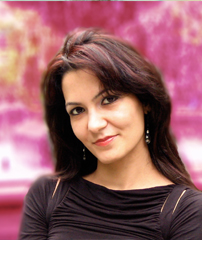Mitra Osqui tried her best to keep an open mind when she visited graduate schools in the greater Boston area. The young electrical engineer had just been awarded a fellowship, and now all she had to do was find a graduate degree program, and get accepted. Boston is full of great universities, Mitra said, but the instant she saw the grand columns and lofty dome of 77 Massachusetts Avenue, her search was over. She was in love. "I applied only to MIT," said Mitra, "I just didn't want to go anywhere else, and I didn't care." Years later, she would look back and appreciate that while many people want to study at MIT, most of them have a back-up plan or two. But the energetic engineer had already racked up a list of accomplishments that justified her confidence. She'd finished college at age seventeen, and was recognized by "The Guinness Book of World Records" as the youngest person to graduate with a Bachelor of Science in Electrical Engineering. After graduating, she went on to work in industry and by the time she was shopping around for a graduate program, Mitra was a Senior Electrical Engineer at Raytheon, a defense technology company. As she'd hoped, Mitra's single-application gamble paid off. She was accepted to the Microsystems Technology Laboratory at MIT. Although she applied for and was accepted to the Ph.D. program, Mitra had to head back to her job at Raytheon for two years after finishing her master's degree, as a condition of the fellowship. "I actually didn't want to leave school and go back [to work]," she said, "but of course I didn't have a choice. I was very sad to leave and unbelievably happy to come back."
When she returned to MIT, Mitra decided to shift her focus. As a master's student, she'd done work that was experimental in nature, and she found herself longing to switch to theory. She wanted to spend her hours steeped in more abstract engineering problems that required mathematical rigor and intuitive thinking. So she set out to find a new problem to study and a research environment that would allow and encourage her to pursue her interests freely. Eventually, at the suggestion of her husband and colleague, then LIDS student and now research scientist Mardavij Roozbehani, Mitra found what looked like the perfect topic, tucked away in a textbook of unsolved problems. She'd been interested in the topic of analog to digital conversion ever since she encountered the subject as a master's student. But until Mardavij suggested it, Mitra hadn't run into the interesting control-theoretic interpretation presented in the book. Mitra took the idea to LIDS professor Alexandre Megretski, who was one of the editors of the textbook. Professor Megretski was happy to learn of her interest and he brought Mitra to LIDS as a Ph.D. student. The problem that Mitra is captivated by—frequency selective analog to digital conversion—has a wide range of applications. "Any digital electronic system that interacts with an analog environment requires an Analog to Digital Converter," said Mitra. Audio/video and music applications, communication devices, and data conversion/storage systems all rely on signal converters. But every time an analog signal is converted into a digital one, some of the information is inherently lost in the process. Mitra is working on finding a methodology for designing an optimal conversion process—she wants to create the steps to make a scheme that will minimize the amount of data that gets lost during the conversion. The problem that she's working on can be approached in many ways, Mitra said, but it hasn't been treated in an optimal feedback control framework before. She's hopeful that her work will produce a novel optimal design and, she says, working with this kind of a complex theoretical system is just plain fun.
Mitra fits right in at LIDS, where theory is the cornerstone of everything the scholars do, and all her colleagues share her enthusiasm for tough, analytical work: After all these years, she's still in love with MIT, and she loves the intellectual fit she's found at LIDS. She reports that Professor Megretski is "very generous with his time and very patient. He's a wonderful and an amazing advisor, he really deeply cares about his students." Even the long hours that are often a requirement of graduate work don't seem to dampen her cheer. She comes to the lab in the mornings, and leaves late in the evening and occasionally, she says, "I stay very late." On those days when she comes in early and stays very late, Mitra doesn't feel discouraged. She's part of a community where everyone works hard. The memory of being in the lab until two-thirty in the morning one night, working up against a deadline to submit a paper for an upcoming conference, made her smile.
"The cool thing was that a few other LIDS people were here too," she laughed, "We were all submitting to the same conference. It's 2:30 AM and you see your colleagues here." Mitra says she's motivated by her desire to get her Ph.D., something that has been an educational goal of hers since she was in high school. She has about a year and a half of work left on her Ph.D. thesis, and after that Mitra has another challenging plan in store for herself. "My goal further down the road is that I want to be faculty," said Mitra, "Actually, I'd love to be faculty at LIDS. That's my dream."




